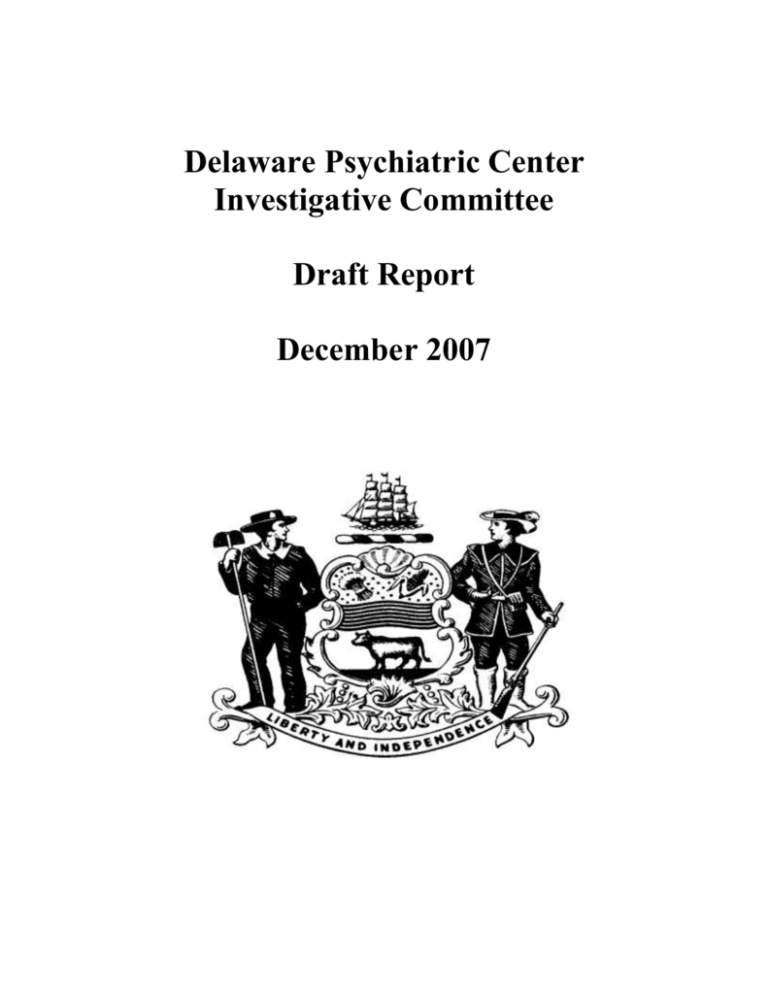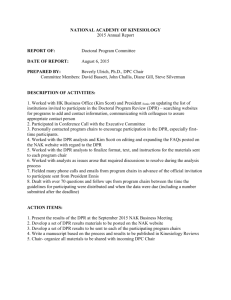Delaware Psychiatric Center
advertisement

Delaware Psychiatric Center Investigative Committee Draft Report December 2007 I. Introduction On behalf of all members of the Delaware Psychiatric Center House Investigative Committee, the committee chairman Representative Richard C. Cathcart submits to the members of the 144th General Assembly this Final Report of the findings and recommendations following a thorough examination of the Delaware Psychiatric Center (DPC). The Committee was created in July 2007 by Speaker Terry R. Spence after public outrage over the alleged abuses, rapes and mistreatment of patients and employees at the state run psychiatric center. It fell to the Legislative Branch to provide a forum of redress for the citizens of Delaware after it became apparent that the Executive Branch was unwilling to allow a public forum for discussion of conditions at the DPC. For a period of almost five months the Committee held public and confidential hearings, executed subpoenas for testimony and documents and solicited the public at large for any information regarding the conditions and patient treatment at the DPC. After reading through thousands of pages of documents and receiving sworn testimony from more than 60 witnesses, with varying degrees of familiarity and experiences at the DPC, it is clear that an atmosphere of abuse, neglect and intimidation continues to exist. It is disappointing that no one in the facility’s administration has been successful in discouraging or disbanding these inexcusable acts. This includes administrators at every level of the Department of Health and Social Services (DHSS), including Susan Robinson (Former Director, DPC), Renata Henry (Director, Division of Substance Abuse and Mental Health-DSAMH) and the Secretary of DHSS, The Honorable Vincent P. Meconi. Ultimately, this senior leadership team must be held accountable for the conditions and the existing atmosphere of abuse, neglect and intimidation. The Committee has no faith in the leadership of this department as it relates to the operation of the DPC and, therefore, will be recommending at the conclusion of this report that the DPC be removed from DHSS altogether and be made an independent authority to be run by a governing board. In the interim a medically-trained director should be appointed by the Governor. Operation of the DPC should be permanently removed from the purview of DHSS and be directly overseen by the Governor. The Committee finds this to be a very sad time in the history of the center as it was brought to the attention of the Committee that the DPC was once considered a premier psychiatric institution at the national level. To see that the DPC has fallen to a level of disrepair and neglect and that the patients are treated with disdain and disregard by a handful of problematic employees is a blemish on the luster of the many social services delivered by DHSS on a daily basis. The Committee, however, recognizes that the vast majority of the employees at the DPC are dedicated individuals who care very deeply about the protection, treatment and quality of care the patients receive in the facility. Some employees have testified that they are embarrassed to be associated with the reports filed in the local media regarding the DPC. The Committee stands with these employees and is equally appalled at the many horrible deeds and transgressions that have occurred. The patients of the DPC and their families have a right to expect that the 2 environment at this facility is one that guarantees the basic rights of all those seeking compassionate care and mental wellness and provides an atmosphere that is free from abuse and neglect. Further, employees of the DPC have a right to a work atmosphere that is safe and free of intimidation and retaliation. Regardless of the ultimate resolution of this terrible situation at the DPC, the Governor should and must order the immediate restoration of these basic rights and protections of both patients and employees until a more permanent overall solution is in place. II. Findings and Recommendations Throughout the testimony period of this investigation the Committee heard many suggestions that would improve the conditions, atmosphere and delivery of care at the DPC. Below are the findings and recommendations that need to be addressed immediately. Finding # 1 The Disabilities Law Program (DLP) is a special project of Community Legal Aid Society and is charged with protecting patient safety under the federal Protection and Advocacy for Individuals with Mental Illness Act (PAIMI). The DLP is charged with investigating allegations of abuse and neglect and advocating for the rights of its constituents. Currently, the DLP Patient Advocate, based at the DPC, only learns about a case of abuse and neglect directly from patients, instead of by automatic notification by the facility that an incident report (which is currently referred to as a PM-46 and/or RI-33 report) was filed. The current policy structure greatly impedes the patient advocate’s efforts to serve the patients because of the lack of automatic notification. Recommendation # 1 All incident investigations (currently referred to as PM-46 and RI-33 reports), whether substantiated or not, patient on patient incident reports, patient seclusions, serious injuries and deaths (including ones that occur after a patient is transferred to another facility) shall be given directly to the DLP in non-redacted form within 24 hours of the incident report filing. This suggestion was proposed to Secretary Meconi and his counsel, Joeseph Schoell, at the September 11, 2007 and December 3, 2007 public hearings and, at both times, the Committee urged the Department to design and implement as soon as possible a process by which the Patient Advocate would be automatically notified when an abuse report is filed. It is our understanding that this process has yet to be incorporated as part of DPC policy and the Committee will propose legislation to accomplish this endeavor. These filings must also have a sequence order to ensure a proper accounting of all reports being filed. Other states that require this type of automatic reporting to the patient advocate are Illinois, Maine, Maryland, North Carolina and Virginia. 3 Finding # 2 The Committee heard disconcerting testimony regarding the use of the four-point restraint (code green) in de-escalating a patient at the DPC. The facility’s Seclusion or Restraint policy states that the four-point restraint allows for “the use of leather bracelets or other hospital-approved restraints to restrict the movement of a patient’s limbs. The bracelets are attached by means of a belt to a bed frame so that the patient is maintained in a supine position.” Recommendation # 2 The Committee recognizes the need for patients to be de-escalated in a manner that protects their safety, as well as the safety of other patients and staff. However, the Committee finds that the use of the antiquated four-point restraint is problematic at best. In August 2007 the U.S. Department of Justice found after investigating the Connecticut Valley Hospital that the use of the four-point restraint is “no longer considered acceptable restraint use” because of “potential serious patient injuries.” The Justice Department states that the use of the four-point restraint is “in contrast to generally accepted professional standards.” The Committee recommends that the DPC immediately revise its policy on the use of the four-point restraint to reflect that it is no longer an accepted professional standard for de-escalating a patient at the DPC. This procedure is traumatic for all involved and shocks the conscience of any reasonable person. To that end, the Committee also recommends the following: CREATE A PLAN TO ELIMINATE SECLUSION AND RESTRAINTS An important step in creating a culture of recovery is to commit to phase out the practice of seclusion and restraint altogether. Several states, including Connecticut, New Jersey, New York and Texas, have received grants from the Substance Abuse and Mental Health Services Administration (SAMHSA) to implement plans to eliminate seclusion and restraint practices. Although Delaware is not a recipient of one of these grants, the DPC should nevertheless create such a plan. By way of contrast, the Division of Developmental Disabilities Services (DDDS) prohibits the use of seclusion and only permits restraints after full documentation that other less intrusive interventions have been attempted. DDDS further requires a review of all interventions by its PROBIS committee and a Human Rights Committee. If other states and a Division within the DHSS system try to minimize seclusion and restraints of challenging populations, the DPC should as well. 4 TRAINING ON DE-ESCALATION The Committee believes that additional training on de-escalation and traumainformed care will help equip staff to work with patients so that restraints and seclusion never become an option. Trauma-informed care focuses on treating patients with an understanding of their life experiences, past trauma, and individualized needs. An alternative is also to invite patients to write their own plans that identify their stress triggers and strategies to manage agitation and anger. When patients plan their own recovery, they become empowered and staff becomes more knowledgeable of individualized needs. However, circumstances exist when patients may need to be restrained if other alternatives fail. In those cases, the Committee recommends the following actions: DEBRIEFING WITH PATIENT WITH SOMEONE NOT INVOLVED IN THE INCIDENT AND THE DLP PATIENT ADVOCATE The Committee believes that patients should debrief initially with staff who are not involved in the seclusion or restraint incident. Patients may divulge more information about how they were treated to a neutral staff member. (Once the initial debriefing is done with a non-participant, the Committee recommends that the treatment team converge to debrief the incident.) We also suggest that the DPC offer patients the opportunity to have the DLP Patient Advocate present during the debriefing. This will help ensure that patients’ rights are protected and that there is transparency in the seclusion/restraint practices. WITNESSING Currently, clinical leadership is notified the next “regular work day” when a patient experiences prolonged or multiple episodes of seclusion or restraint. However, every time a patient is placed in restraints, executive staff should be called, in their office or at home. They should come to the unit, if at all possible, to see what happened and talk to staff and patients involved as soon as possible. Some hospitals use an on-call system to rotate which staff member is contacted. The purpose of this is to emphasize that restraints are systems failures and that each restraint is a serious issue. Witnessing promotes strong leadership and the opportunity to examine the incident. A STRONGER RESTRAINT LAW OR REGULATIONS ADDING TO THE MENTAL HEALTH PATIENT’S BILL OF RIGHTS The Delaware Mental Health Patient’s Bill of Rights entitles patients at the DPC to be free from “abuse, mistreatment and neglect, and unjustifiable force.” It further prohibits “seclusion, physical restraint, drugs or other interventions” unless “documented contemporaneously by the written order of an authorized mental health professional to the extent necessary to prevent physical harm to self or others.” This law does not go far enough to protect the rights of patients in mental health facilities because it does not 5 explicitly outline what is and is not an acceptable practice. The Committee recommends that Delaware expand its Mental Health Patient’s Bill of Rights to include additional language on the use of restraints. For example, a strong restraint law should include: (1) A strong purpose statement. (2) Definitions and conditions for use of restraint. (3) A limit on the types of restraints permitted (including banning the use of the four-point restraint). (4) Admissions screening to determine whether the patient has been a victim of abuse or to determine what triggers may escalate a patient’s behavior. (5) A designation of who may order the restraint. A strong law would require a physician to order the restraint, or have the doctor examine a patient within an hour of the restraint when it is not possible for the doctor to order it. The current law provides that a restraint order come from a “mental health professional” pursuant to 16 Del C. §5161. (6) Monitoring, assessment and comfort to ensure that the patient is constantly observed and assessed for comfort. (7) Limited duration of the restraint order—(but allow for possibility of renewal if a restraint is still necessary after the time frame has expired.) (8) Debriefing—patient and staff should debrief together to determine what steps could prevent a restraint in the future. (9) Staff Training—require training on an annual/biannual basis. Ensure that the training is uniform among staff. (10) Data Collection—ensure that the facility is tracking the incidents of seclusion and restraint, the staff shifts, durations, etc. (11) Witnessing/leadership notification—Executive staff should be informed and involved in restraint decisions. In addition, leadership should emphasize a culture of recovery as a model for the entire staff. (12) Family notification—The treatment team should ask the patient whether notifying his or her family is appropriate. 6 Finding # 3 The Committee learned that there is not an independent board that regularly reviews PM-46 reports or other significant incidents or deaths within the DPC. This is of concern due to the inherent nature of oversight of a system that only reports to itself. Again, the Committee does not believe that the administration of the DPC accepts that this is a significant issue and the will to change this process is lacking. Recommendation # 3 An independent committee should be created to regularly review all PM-46 reports and other significant incidents or deaths that occur within the DPC. This committee should be comprised of two boards, with one board focusing on abuse and neglect allegations and the other focusing on other significant incidents and deaths. This committee should meet at least quarterly to review all incident investigations, sentinel events (as defined by the Joint Commission on Health as “an unexpected occurrence involving death or serious physical or psychological injury, or the risk thereof. Serious injury specifically includes loss of limb or function. The phrase 'or the risk thereof’ includes any process variation for which a recurrence would carry a significant chance of a serious adverse outcome.”), and deaths. Annually, the Boards should be charged with producing a public report to track patterns and trends of morbidity and mortality within the DSAMH system as a way to foster transparency and accountability. The DLP has suggested, and the Committee concurs, that the first board be comprised of community organization representatives to ensure that the human rights of individuals being treated at the DPC are protected. The second board should be created similarly to the Department of Correction and the Division of Developmental Disabilities Services mortality/morbidity review boards. The DLP has requested DSAMH on many occasions in the past nine months to create these boards, but, to date, none has been created. It is the Committee’s understanding that this policy has yet to be implemented and the Committee will propose legislation to accomplish this endeavor. The Committee fully expects DHSS to create these boards and, immediately thereafter, to appoint the membership reflective of the community and appropriate parties, respectively. Other states that have statutory mandates for these committees are Maryland and New Hampshire. Finding # 4 The director of the DPC and the director of DSAMH do not have nor are they required to have any medical training. Recommendation # 4 The director of the DPC and DSAMH should both be board-certified psychiatrists. The director of the DPC should report directly to the Secretary of DHSS or 7 proposed governing board of the facility and shall no longer report to the director of DSAMH. The patients and staff of the DPC should have every confidence that the decisions made by administrators have the highest level of clinical skill and expertise available and, more importantly, will ensure the continuity and standard of patient care. It is the Committee’s understanding that this policy has yet to be implemented and the Committee will propose legislation to accomplish this. Finding # 5 The Committee heard testimony as it relates to reports of alleged staff intimidation, retaliation and personal property vandalism at the DPC. The Committee believes that most of the testimony to this fact is credible and, in many cases, substantiated by police reports and incident reports. Recommendation # 5 Security cameras at the DPC have been installed and the Committee applauds that effort. These cameras should be used to review every instance of alleged patient abuse or neglect or staff intimidation or retaliation. The Committee also recommends that a zerotolerance policy be adopted immediately that would result in the termination of any employee of the DPC proven to have committed such acts of patient abuse, neglect, intimidation, retaliation or vandalism. Finding # 6 The Committee heard sworn testimony about an atmosphere of staff intimidation and threats at the DPC. The Committee believes that the vast majority of this testimony is credible and, in some cases, corroborated by other testimony. Recommendation # 6 The Secretary of DHSS or proposed governing body of the DPC should immediately implement a zero-tolerance policy for any substantiated claims of staff intimidation or threats. The DPC cannot effectively function as a safe refuge for patients seeking mental wellness if the staff is gripped with an attitude of fear and reprisals. This severely impacts the level of care that can be administered to patients and, ultimately, undermines any clinical efforts to administer the standard of care. The Committee appreciates that it is often very difficult to deal with these types of situations but recognizes the need to immediately address such instances. Delaware State Police must be called in to investigate any claims of staff intimidation, retaliation or vandalism. The Committee is prepared to ask State Police to consider a report from the DPC a high priority and to fully investigate any matter being reported. 8 Finding # 7 The Committee heard sworn testimony in which an investigator with the Division of Long Term Care (LTC) Residents Protection stated that they did not interview the victim of an alleged abuse during the PM-46 investigation process. The Committee has transcripts of the investigator’s testimony that substantiates this fact. Recommendation # 7 In concurrence with DPC policy, the Committee believes that it is incumbent upon all DPC and LTC investigators to interview every person involved/named in any PM-46 or RI-33 report. The patient should be afforded an opportunity to be interviewed by investigators following any reported incident. Not interviewing the patient who lodged the complaint should result in disciplinary action against the investigator found to be in violation of current DPC policy. Finding # 8 The Committee heard testimony regarding the abuse of overtime monies and dual employment arrangements. Recommendation # 8 In an era of nursing shortages the state must remain competitive with employment packages that are equal or superior to the private sector. This should include affording nurses every opportunity to work overtime shifts to the extent that patient care is not compromised. The Committee does not suggest, however, that any nurse or attendant should work, for example, 80 or more hour weeks for weeks on end. The Committee suspects that patient care is being compromised in these situations and recommends that this practice cease immediately. The $4.5 million state appropriation used annually for overtime should more than compensate/justify the hiring of several fulltime registered nurses, clinical social workers and assistants. Overtime in the healthcare industry is a necessary expense. However, overtime should be merit based and accessible to all employees. In addition, the one-on-one and two-on-one supervision procedures of patients should be reviewed hourly. For example, a patient may de-escalate within a few minutes of being placed on a one-to-one observation. Currently, a review of that observation would happen only after 24 hours. The Committee recognizes that this may be a waste of resources and calls on DHSS to research industry standards and best practices to ensure resources are being used efficiently and effectively. Finding # 9 The Committee heard testimony about and saw first-hand the physical conditions of the DPC. It is an aged center that has many deferred maintenance issues. 9 Recommendation # 9 While the Committee believes strongly that a new building is not a panacea, it does believe that deferred maintenance issues should be addressed immediately and that great consideration should be given during the Fiscal Year 2009 budget process toward upgrading the current center. It is preferable that the center have a non-industrial/noninstitutional atmosphere. The Committee believes steps can be made to mitigate the negatives of the building through regularly scheduled maintenance of the building. The Committee urges and will advocate to the Joint Finance Committee to give great weight to allocating additional funding directly to the DPC to fund these necessary improvements of the facility. Finding # 10 The Committee heard testimony regarding the lack of medical certification needed to attain the post of unit director at the DPC. Recommendation # 10 All units should be run by board-certified psychiatrists and registered nurses. Much like requiring that the director of both the DPC and DSAMH be board-certified psychiatrists the patients and staff should have every confidence that decisions on each unit are being made with the highest level of clinical skill and expertise. More importantly this requirement will ensure the continuity and standard of patient care. Finding # 11 In many instances of patient abuse administrators and staff failed to notify Delaware State Police. Recommendation # 11 The staff at the DPC will follow the investigatory process as detailed in the internal flow chart provided to the Committee during its examination of the facility. This flow chart requires State Police to be called in situations of sexual assault, suspected physical abuse, immediate danger and property loss. In an ambiguous case the DPC should “error on the side of caution” as stated by the DPC Interim Director, Guy Perrotti, at the December 3, 2007 public hearing. A zero-tolerance policy should be implemented and an employee found not adhering to the policy should be immediately terminated. The Committee expects State Police to consider reports of this nature by the DPC a high priority call and be treated with the utmost importance. The Committee will prepare a memorandum of understanding for State Police to ensure compliance if necessary. Also, a policy memorandum needs to be issued by the administration of the DPC to all staff delineating the responsible party charged with placing the call to State Police. 10 Finding # 12 The Committee heard testimony regarding the protection of patients who file reports of abuse, neglect and/or crimes. Recommendation # 12 An anti-retaliation section needs to be added to the PM-46 and RI-33 reports to protect those who allege or report any acts of abuse, neglect and/or crimes within the DPC. This language exists currently in the Delaware Ombudsman Law (16 Del.C. Sec. 1135) and the anti-retaliation statute (16 Del.C. Sec. 1135) to protect reporters of abuse and neglect in long-term care facilities. This change should be made internally by DHSS if possible. However, the Committee will offer legislation to this end as well. Finding # 13 The Committee heard during the course of its investigation that the patients currently in the DPC could not be transitioned into community placements due to the seriousness of their diagnosis. However, the DPC has just decided that at least 35 patients are in fact well enough to live in community placement Recommendation # 13 The Committee commends the effort to place more individuals in the community. As a result the announcement to discharge 35 DPC patients into the community, the Committee encourages the DPC to carve out requirements for safe and appropriate discharge. To effectuate a safe transition, the Committee encourages discharge plans to include an individualized assessment; secure housing; a crisis plan; the level of appropriate supervision; and identification of needs for personal care, psychiatric, medical, medication, legal and financial considerations. Finding # 14 The Committee finds that the current administration of the DPC has lost the faith of the public’s confidence and calls for an immediate change of oversight of the DPC. Recommendation # 14 The General Assembly should enact legislation that will create a structure for the DPC to be run as an independent authority directed by a governing board. The Committee recommends that the state continue to fully fund this authority at or above current levels to assure its success and smooth transition. All current employees of the DPC should be rehired under a 90-day probationary period to ensure that all employees are reevaluated and deemed productive to the center and, most importantly, to its patients. The Committee will propose legislation to accomplish this endeavor. In the interim a 11 medically-trained director should be appointed by the Governor. Operation of the DPC should be permanently removed from the purview of DHSS and be directly overseen by the Governor. III. Conclusion The citizens of the state of Delaware have benefited from the creation and work of the bipartisan Delaware Psychiatric Center Investigative Committee. All of the Representatives have contributed a significant amount of time to this process. By doing so, they have ensured that the Legislative Branch fulfills its Constitutional duty in providing a check on the Executive Branch, especially in circumstances when the Executive Branch has been unresponsive or laggard to the outcries of its citizenry. The Committee sincerely regrets that the patients, families and staff at the DPC have had to endure mistreatment of any kind. The Committee expects, however, that through the findings and recommendations of this report these individuals will soon be able to find some solace and hope for a better future at the DPC. The Committee will endeavor to immediately change the atmosphere at the DPC by implementing the proposed recommendations. Ultimately, however, the effort will require all persons connected with the Delaware Psychiatric Center to stand up and make sure their voices are heard. In this vain the Committee will make available all information gathered during the course of its investigation to the Delaware Attorney General’s Office and to the United States Attorney’s Office to aid the agencies in their respective investigations. Our society will be judged by how well it treats those most vulnerable among us and the DPC has a checkered past in this regard. However, through the immediate implementation of these recommendations, it is the Committee’s hope that a level of respectability can be restored and the journey of rebuilding the reputation and exceeding standard of care delivered by the Delaware Psychiatric Center can commence once again. Respectfully submitted: The Honorable Richard C. Cathcart, Chairman The Honorable Joseph W. Booth The Honorable Bruce C. Ennis (Resigned Office) The Honorable Bethany A. Hall-Long The Honorable James Johnson The Honorable Pamela S. Maier The Honorable Nick T. Manolakos (Alternate) The Honorable Melanie George Marshall The Honorable William A. Oberle, Jr. The Honorable Hazel D. Plant The Honorable Robert J. Valihura, Jr. The Honorable Nancy H. Wagner 12 13








